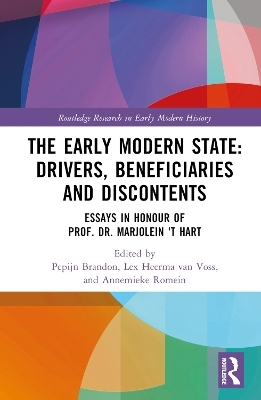
The Early Modern State: Drivers, Beneficiaries and Discontents
Routledge (Verlag)
978-0-367-54468-3 (ISBN)
In the course of the early modern period, the capacity of European states to raise finances, wage wars, subject their own and far away populations, and exert bureaucratic power over a variety of areas of social life increased dramatically. Nevertheless, these changes were far less absolute and definitive than the literature on the rise of the "modern state" once held. While war pushed the boundaries of the emerging fiscal military states of the seventeenth and eighteenth centuries, rulers remained highly dependent on negotiations with competing elite groups and the private networks of contractors and financial intermediaries. Attempts to increase control over subjects often resulted in popular resistance, that in their turn set limits to and influenced the direction of the development of state institutions. Written in honour of the leading historian of war and state formation in the early modern Low Countries, Marjolein 't Hart, the chapters gathered in this volume examine the main drivers, beneficiaries and discontents of state formation across and beyond Europe in the early modern period.
Pepijn Brandon is chair of Global Economic and Social History at VU Amsterdam, the Netherlands, and Senior Researcher at the International Institute of Social History in Amsterdam, the Netherlands. Lex Heerma van Voss is the former director of the Huygens Institute for the History and Culture of the Netherlands in Amsterdam, the Netherlands, and emeritus professor in the history of social security at Utrecht University, the Netherlands. Annemieke Romein is postdoctoral researcher in early modern political-institutional/legal history at the Huygens Institute for the History and Culture of the Netherlands in Amsterdam, the Netherlands.
Introduction / Powerless Representatives? Warfare’s Contrasting Impact on Early-Modern Political Participation / Economic Acceleration in the Dutch Republic, 1585–1637 / Paper Suits of Armour. Sauvegarde, Brandschat, and Security in the Countryside During Wartime in the Sixteenth-Century Netherlands / The Formative Role of Early-Modern Books of Ordinances. The Low Countries and their Overseas Lands / The States’ Army of Flanders and the English Roads, 1577 to around 1610 / Finance, Money, Corruption, and the English Exchequer Bill Scandals of 1697–1699 / The Military-Commercial Complex. Contracting the Eighteenth Century British Army / The Politics and Geopolitics of the British Debate on Monetary Policy for Warfare against Revolutionary and Napoleonic France, 1793–1821 / Ministers on Demand. French Senior Government Officials as Transnational Agents of Modernity in Napoleon’s Brother Kingdoms / Grasping Opportunities in Times of Crisis? The Community of Dutch Maritime Traders in the Port of Antwerp During the French Period / The State, Taxes, and Popular Protest in the Netherlands in the Napoleonic Period (1806–1813) / Varieties of Force. State-Organized Production, Industrialization, and Coerced Labour in Nineteenth-Century Naval Shipyards
| Erscheinungsdatum | 16.05.2022 |
|---|---|
| Reihe/Serie | Routledge Research in Early Modern History |
| Zusatzinfo | 3 Tables, black and white; 2 Line drawings, black and white; 1 Halftones, black and white; 3 Illustrations, black and white |
| Verlagsort | London |
| Sprache | englisch |
| Maße | 156 x 234 mm |
| Gewicht | 560 g |
| Themenwelt | Geschichte ► Allgemeine Geschichte ► Neuzeit (bis 1918) |
| Geisteswissenschaften ► Geschichte ► Regional- / Ländergeschichte | |
| Geschichte ► Teilgebiete der Geschichte ► Militärgeschichte | |
| ISBN-10 | 0-367-54468-7 / 0367544687 |
| ISBN-13 | 978-0-367-54468-3 / 9780367544683 |
| Zustand | Neuware |
| Haben Sie eine Frage zum Produkt? |
aus dem Bereich


